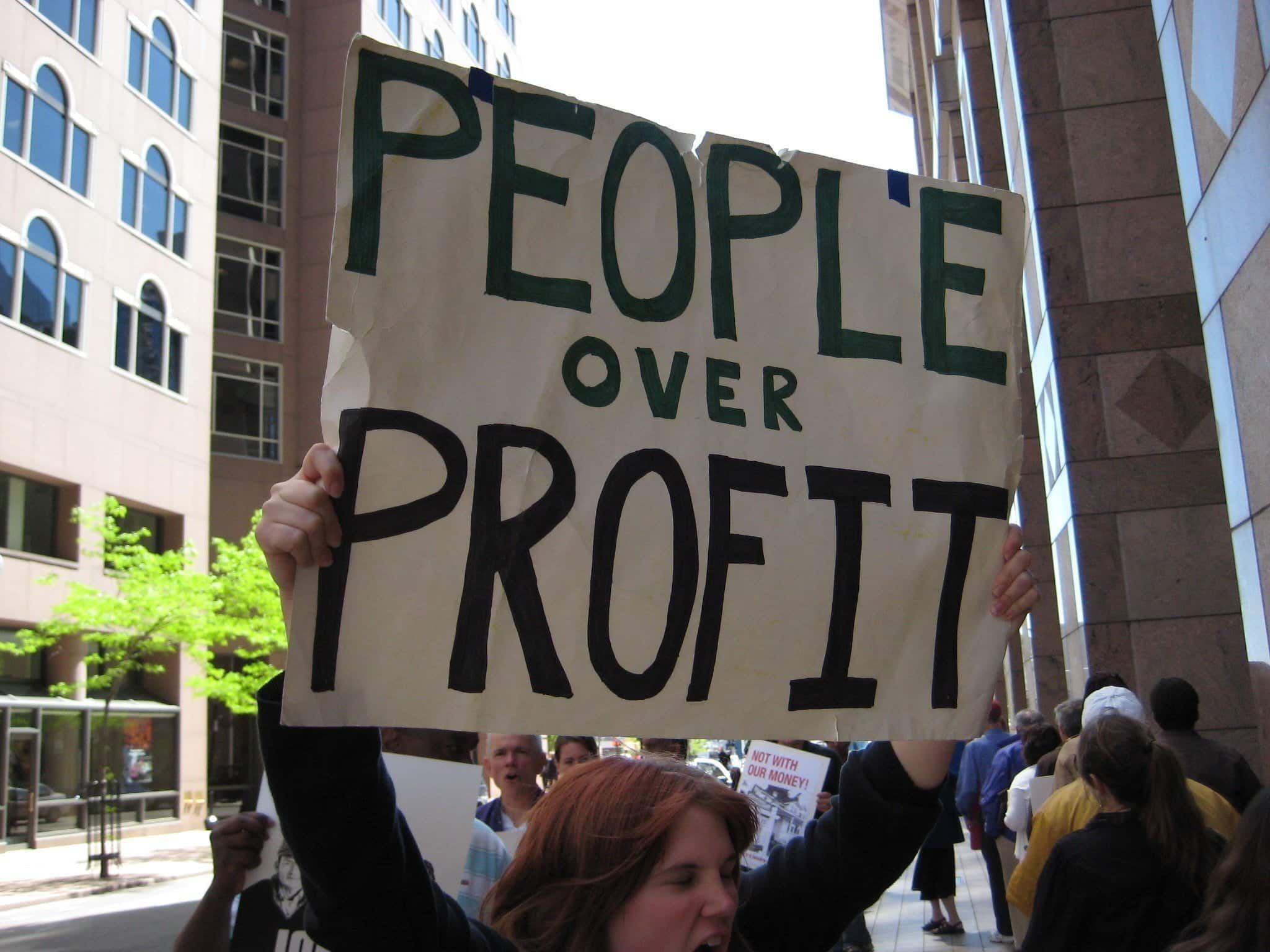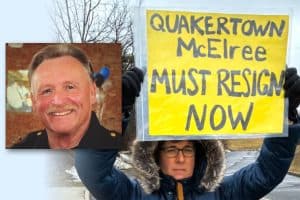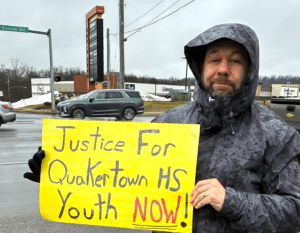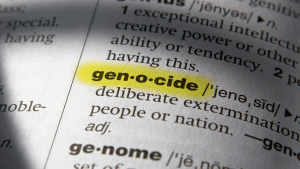Over 8,000 Americans, on average, die every day. Many of these Americans die unnecessarily. Their cause of death? The United States — our planet’s richest nation — still does not have in place a national health care system that guarantees everyone adequate medical attention.
One particular American’s death this past week has refocused attention on that absence. On December 4, a gunman murdered the chief executive of a corporate insurance powerhouse that regularly registers hefty profits denying health help to sick people who desperately need it.
That chief exec — UnitedHealthcare’s 50-year-old Brian Thompson — died on a Manhattan sidewalk after a short hail of bullets. A suspect in the case, Luigi Mangione, has been charged in the shooting.
The bullet casings from the shooting carried their own message. They read, according to police sources, “deny,” “defend,” and “depose,” a clear reference to the profit-first gameplan America’s giant insurers ever so relentlessly follow: deny the claim, defend the lawsuit, depose the patient.
Thompson stepped into the UnitedHealth empire over two decades ago and, notes the American Prospect journalist Maureen Tkacik, spent most of his career there “running its Medicare business, the cash cow around which much of the far-flung health care colossus essentially revolves.”
Three years ago, Thompson became the CEO of this “cash cow,” UnitedHealth’s biggest branch. His UnitedHealthcare unit’s 140,000 employees last year pulled down over a quarter-trillion dollars — $281 billion — in revenue. That intake helped his company’s annual profits jump 33 percent over their 2021 level. Thompson himself last year pocketed $10.2 million in personal compensation.
The chief exec of the overall UnitedHealth operation, Andrew Witty, at his end collected some $23.5 million, enough to rank him the nation’s highest-paid health insurance CEO. Witty’s take-home equaled 352 times the pay of UnitedHealth’s typical employee.
What’s been making UnitedHealth’s operations so rewarding for execs at the company’s summit? UnitedHealth operates in the shadowy world of “Medicare Advantage,” the program that gives America’s senior citizens the option to contract out their Medicare to private health-service providers.
These private providers collect fixed fees from the federal government for each of the senior citizens they enroll. They make money when the cost of providing health care to those seniors amounts to less than what the U.S. Department for Health and Human Services pays them in fees. And that core reality gives private providers an ongoing incentive to limit the care their patients receive.
No Medicare Advantage provider, the American Prospect’s Maureen Tkacik points out, has done more than UnitedHealthcare to systematically seize the opportunity that incentive creates — “by simply denying claims for treatments and procedures it unilaterally deems unnecessary.” Industry-wide, Medicare Advantage providers deny 16 percent of patient claims. UnitedHealthcare, the Boston Globe has reported, last year denied patient claims at a 32 percent rate.
The massive advertising campaigns that Medicare Advantage inflict upon the American people never, of course, mention anything about denials or the limits Medicare Advantage plans place on which doctors their enrollees can see and which hospitals they can use. That advertising instead, the KFF health care think tank detailed last year, typically urges viewers to call a toll-free “Medicare” hotline that has no connection whatsoever with the federal government’s official Medicare hotline.
Many of the over 9,000 ads that Medicare Advantage outfits run daily during the annual fall open enrollment period, the KFF researchers add, misleadingly suggest that seniors may miss out on financial savings or benefits “if they don’t sign up for a Medicare Advantage plan.”
For the Medicare Advantage industry, all this advertising has paid off handsomely. Just over half of Medicare’s beneficiaries have now chosen to take privatized care over the original public Medicare.
Seniors with the good fortune to stay healthy usually don’t give their Medicare Advantage plans much of a second thought. But those seniors enrolled in Medicare Advantage who find themselves needing medical help all too often find themselves facing one frustration after another. Years of those frustrations erupted bitterly onto the national scene after Brian Thompson’s murder.
“Thoughts and deductibles to the family,” read one online reaction to a CNN posting of a shooting video. “Unfortunately my condolences are out-of-network.”
“Compassion withheld,” read another reaction, “until documentation can be produced that determines the bullet holes were not a preexisting condition.”
Within hours after Thompson’s death, a research institute at Rutgers University had found scores of similar-in-spirit posts that together reached 8.3 million viewers across multiple platforms. UnitedHealth’s official Facebook report on Thompson’s death, meanwhile, quickly drew 35,000 responses using the social networking “Haha” emote — and only 2,200 emotes expressing “Sad.”
Some of the fiercest reactions to Thompson’s death came from within the medical community.
“This is someone who has participated in social murder on a mass scale,” a medical student wrote in one typical post.
“My patients died,” a nurse spat out in another, “while those bitches enjoyed 26 million dollars.”
“If there’s anything our fractured country seems to agree on,” mused Bloomberg’s Lisa Jarvis, “it’s that the health care system is tragically broken, and the companies profiting from it are morally bankrupt.”
“To most Americans,” agreed the New Yorker’s Jia Tolentino, “a company like UnitedHealth represents less the provision of medical care than an active obstacle to receiving it.”
That obstacle, the numbers show, has been devastatingly effective. The United States, a recent Commonwealth Fund study found, currently rates last in health among major high-income nations. Americans “die the youngest and experience the most avoidable deaths” despite living in a nation that spends almost twice as much on health care — as a share of gross domestic product — as any of its high-income peers.
READ: The Government’s Own Number Crunchers Agree: We Need Medicare for All
Some 25 percent of Americans, Gallup polling adds, have people in their family who have had to delay medical treatment for a serious illness because they couldn’t afford the care. Some 79 percent of America’s nurses, for their part, say they’re working in inadequately staffed health facilities.
Thompson’s murder won’t change any of those stats. The system that enriched him lives on — and the incoming Trump administration figures to make that system even worse. The corporate-friendly Heritage Foundation, in its controversial Project 2025 blueprint for the second Trump term, is proposing that Medicare Advantage become the “default option” for all new Medicare enrollees.
A move along that line, notes analyst Heather Cox Richardson, would “essentially privatize Medicare” and significantly raise the program’s cost.
With Thompson’s death, America’s health care powers feel and fear the American public’s anger now more than ever. These giants, Reuters reports, have already begun enhancing the security they provide their top execs.
The challenge for the rest of us? We need to help channel the anger about health care that so many Americans feel today toward ending the system that has so failed America’s health. We need to remake health care into a vital and vibrant public service.
Our health care system, in the end, shouldn’t be making our rich richer. Our richest instead should be paying enough in taxes to help all Americans stay healthy.
This piece was updated on December 10 to reflect that a suspect has been charged.
This article was originally published at Inequality.org, a project of the Institute for Policy Studies. It is reprinted here via Creative Commons 3.0.






